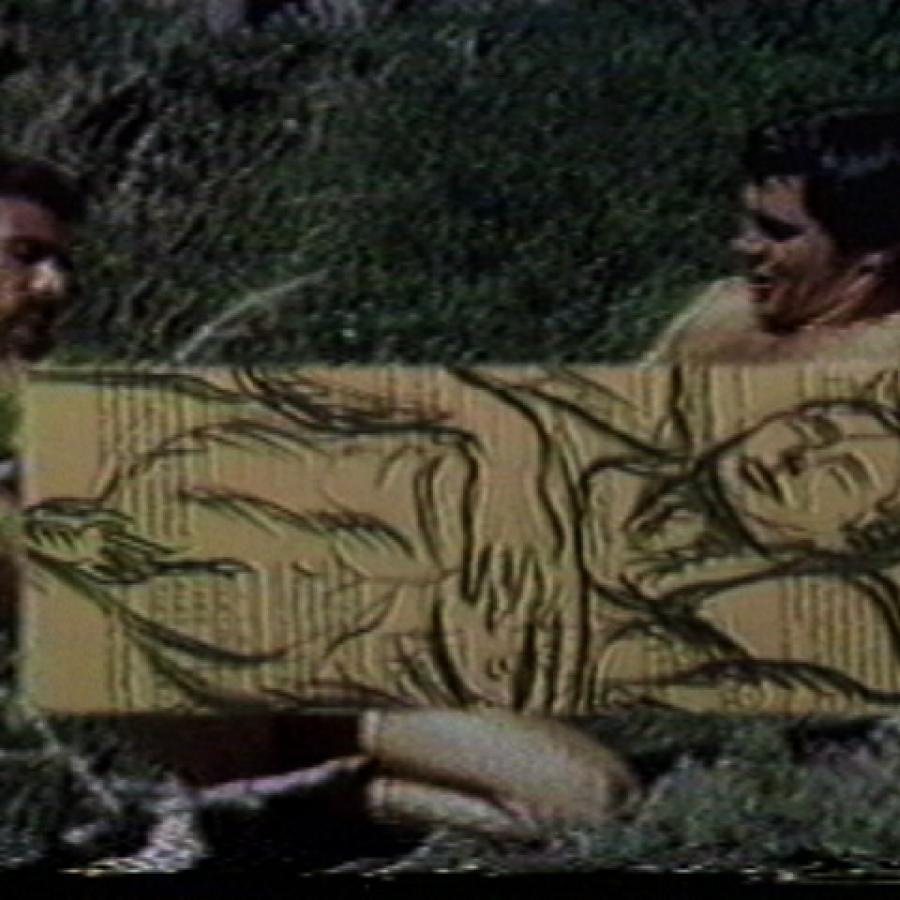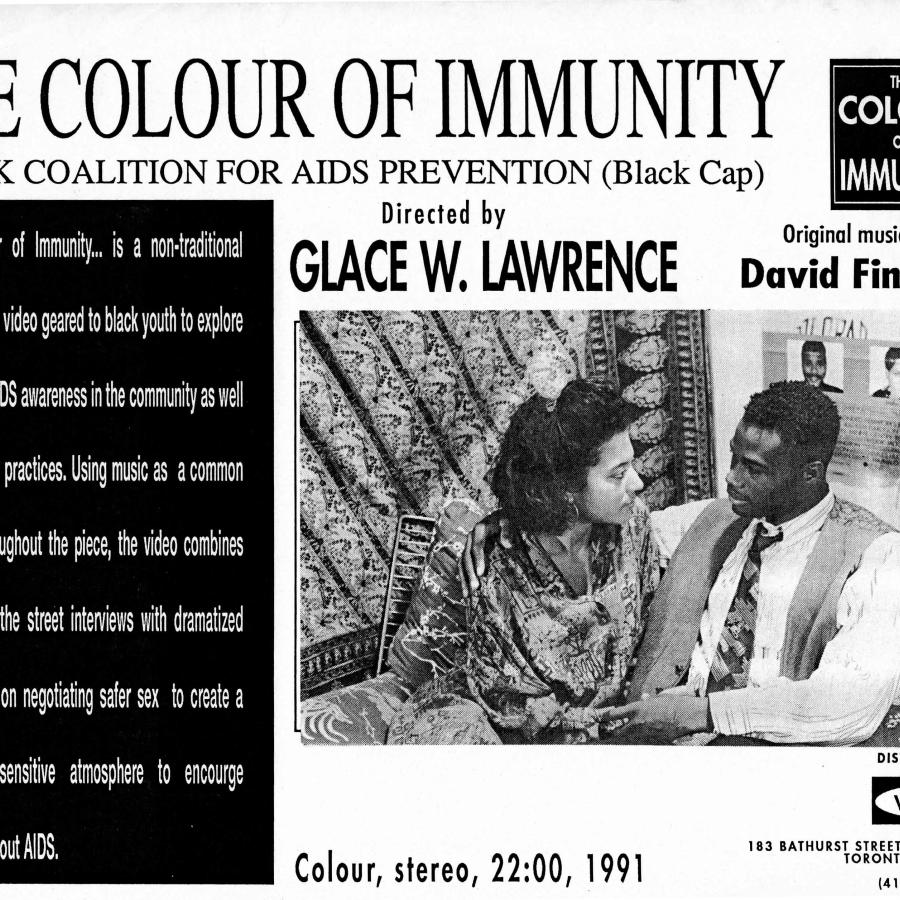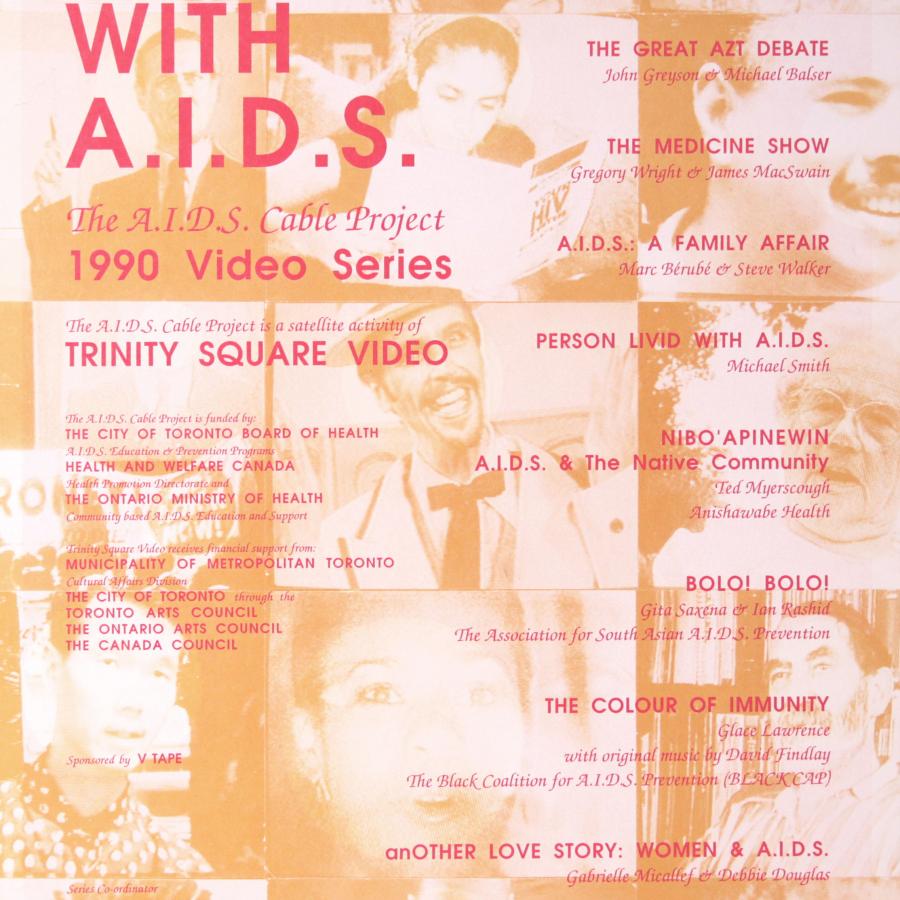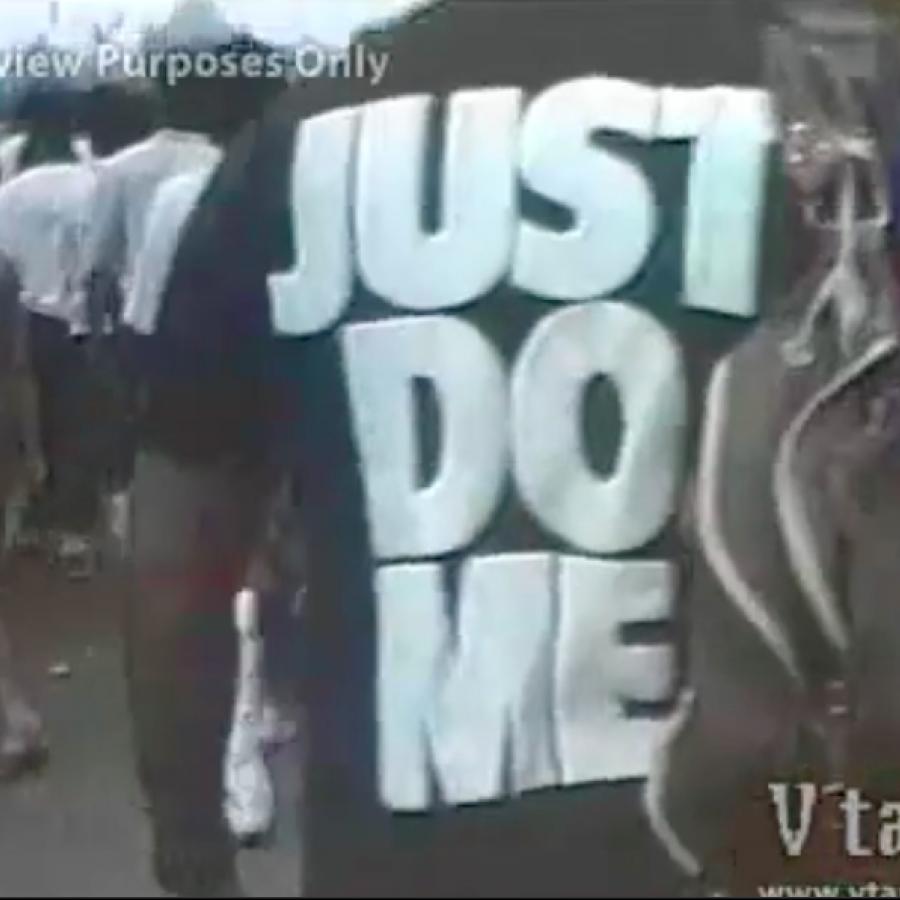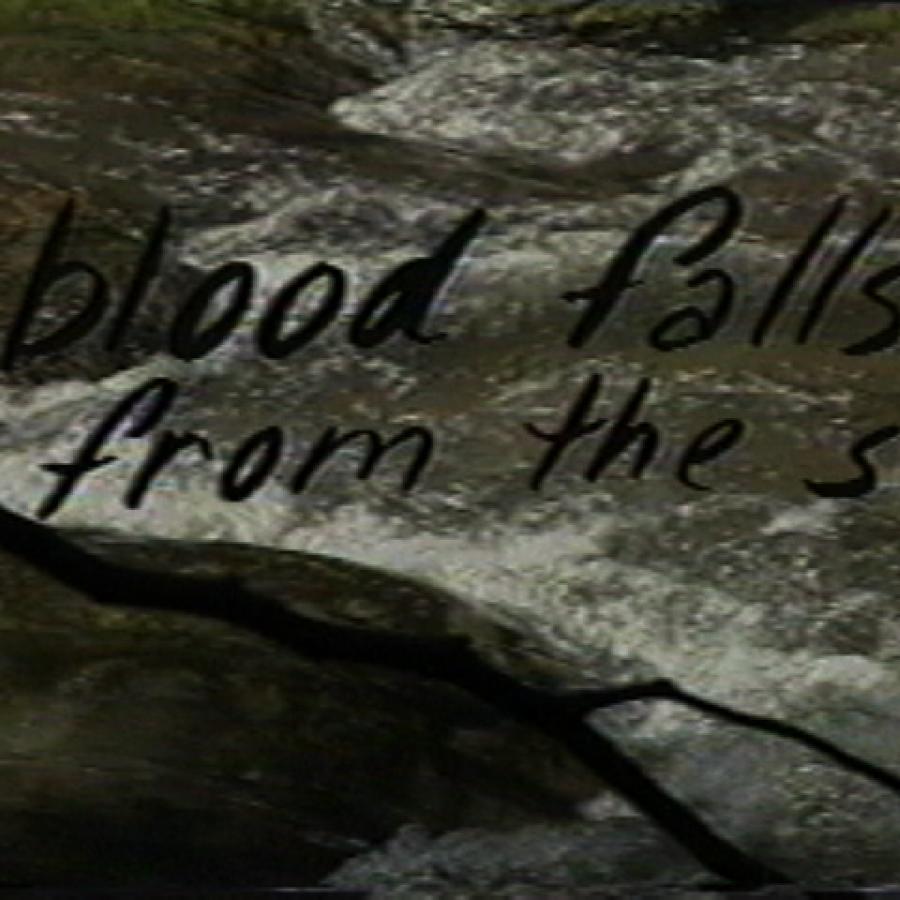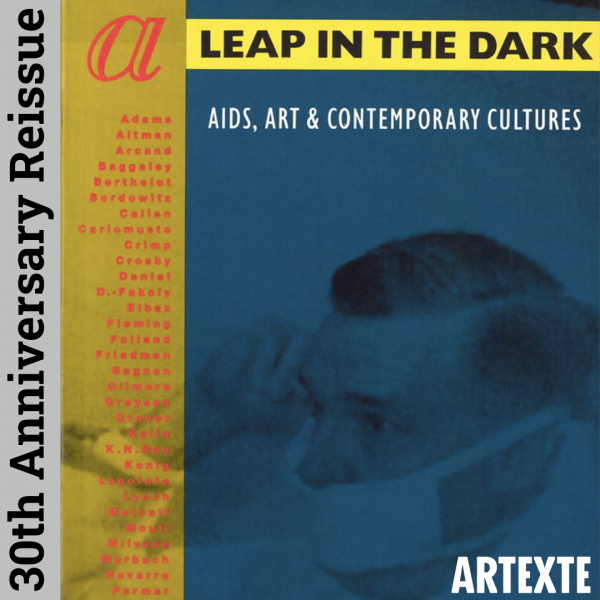Vtape's Case Study consists of two parts: the first focuses on new forms of Public Service Announcements (PSA) in the 1990s designed to function in conventional public venues for video (e.g. public access cable television); the second part examines Toronto Living With AIDS, a 1990-91 public access cable TV program made by artists and cultural workers to provide information about HIV/AIDS directly to affected communities.
These videos were created by artists, activists, and community organizations responding to the AIDS crisis. They drew on ideas and strategies from video and performance art, but also demanded innovative methods of communication required by their community oriented goals. The PSAs were produced by Michael Balser and Andy Fabo through the Banff Media Arts Programme in 1993. They use the 30-second television format of the time and utilize content and knowledge from the AIDS activist community right across the country. Toronto Living With AIDS was coordinated by Michael Balser in collaboration with numerous artists and community organizations. They use the 30-minute television program format of the time and were screened on cable access television.
By digitizing both sets of tapes we are investigating both the content and the context of these radical artworks. These restored titles can re-enter into the AIDS activist discourse and can be used by contemporary AIDS activists in a variety of educational contexts. Both these PSAs and Toronto Living With AIDS studies and restoration projects will be conducted and contextualized alongside the constellation of other related artist and community video works about HIV/AIDS within the Vtape collection.
About Vtape
Vtape is a vibrant distribution organization that represents an international collection of contemporary and historical video art and media works by artists. We make this collection accessible to curators and programmers, educators, scholars, and public audiences worldwide. In addition to providing a distribution framework for established and emerging artists, Vtape is committed to establishing video art preservation and exhibition standards, and strives to support hybrid practices in an increasingly complex technical milieu.
Land Acknowledgement
Vtape acknowledges that Indigenous peoples are the original occupants of this land. Vtape supports the Truth and Reconciliation Commission of Canada: Calls to Action and the United Nations Declaration on the Rights of Indigenous Peoples and is committed to furthering the visibility and understanding of Indigenous art forms and cultural expression. Incorporated in 1983, Vtape is hosted on the lands of the Mississaugas of the Credit River, the Anishinaabe, the Haundenosaunee Confederacy and the Wendat. Toronto is in the 'Dish With One Spoon Territory’, which is a treaty between the Anishinaabe, Mississaugas and Haudenosaunee that bound them to share the territory and protect the land. Subsequent Indigenous Nations, Métis and the Inuit peoples, Europeans and all newcomers have been invited into this treaty in the spirit of peace, friendship and respect. We acknowledge the traditional territories of Indigenous nations worldwide and their continuing connection to the land, sea and community. We pay our respect to them and their cultures, and to the elders both past and present.
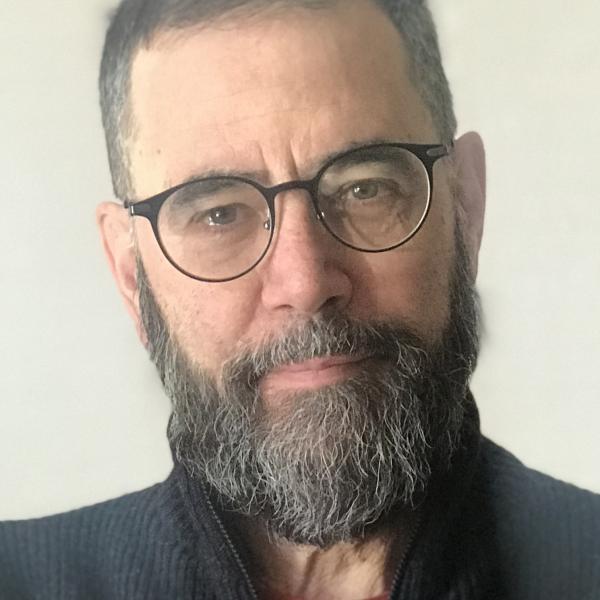
Kim Tomczak
Kim Tomczak is a multidisciplinary artist primarily known for his work in performance, photography, video, and photo/text work. Since 1983, he has worked exclusively in collaboration with Lisa Steele. They have received numerous grants and awards including the Bell Canada prize for excellence in Video Art, a Toronto Arts Award and in 2005, a Governor General’s Award for lifetime achievement in Visual & Media Arts.
Tomczak is a co-founder of Vtape and teaches at the University of Toronto in the Visual Studies program, Daniels Faculty of Architecture, Landscape and Design. Steele and Tomczak were awarded an Honorary Doctorate by the University of British Columbia (Okanagan) in 2009.

Wanda vanderStoop
Wanda vanderStoop provides continuing support to Vtape’s artists, promoting over 5,000 independent productions to worldwide markets, including museums, national and international festivals, broadcasters, educational institutions, and mobile platforms. She is a committed advocate for artist’s rights and fees, and contributes to a policy consultation process on the changing methods of dissemination in video and new media.

John Greyson
The recipient of the 2000 Toronto Arts Award for film/video and the 2007 Bell Award in Video Art, John Greyson is a filmmaker, video artist, writer, activist and educator whose productions have won accolades at festivals throughout the world.
Feature films include: Urinal (1988 – Best Feature Teddy, Berlin Film Festival); Zero Patience (1993 – Best Canadian Film, Sudbury Film Festival); Lilies (1996 – Best Film Genie, Best Film at festivals in Montreal, Johannesburg, Los Angeles, San Francisco); Uncut (1997, Honourable Mention, Berlin Film Festival); The Law of Enclosures (2000, Best Actor Genie); Proteus, co-created with Jack Lewis (2003); and Fig Trees (2008 – Teddy Award for Best Documentary, Berlin Film Festival). Film/video shorts include: The Kipling Trilogy (1984-5), The ADS Epidemic (1987), The Making of Monsters (1991 – Best Canadian Short, Toronto Film Festival; Best Short Film Teddy – Berlin Film Festival), Herr (1998) and Packin’ (2001).
As a director for television, his credits include episodes for such series as Queer as Folk, Made In Canada (Best Director Gemini, 2002), Drop the Beat and Welcome to Paradox.
Professor Greyson’s publications include Urinal and Other Stories (Power Plant/Art Metropole) and co-editor of Queer Looks, a critical anthology of gay/lesbian media theory (Routledge). He is a co-investigator on York’s Future Cinema Lab, a joint research project with Film Professors Janine Marchessault and Caitlin Fisher. Supported by the Canadian Foundation for Innovation, the Future Cinema Lab is a state-of-the-art media research facility into new digital storytelling techniques and how these can critically transform a diverse array of state-of-the-art screens.
John Greyson is active in various anti-censorship, AIDS, peace and queer activist media projects, including The Olive Project, Deep Dish TV, Blah Blah Blah and AIDS Action Now. His contributions as a member and through service on the boards of arts organizations include V/Tape Distribution, Inside Out Film/Video Festival, the Euclid Theatre, Trinity Square Video, Charles St. Video, LIFT (Liaison of Independent Filmmakers Toronto) and Beaver Hall Artists Housing Co-op.
Professor Greyson has taught film and video theory and production in Canada, the United States, Cuba and South Africa. He joined the full-time faculty in York’s Film Department in 2005.

Ryan Conrad
Ryan Conrad is Adjunct Research Faculty at the Feminist Institute for Social Transformation at Carleton University and previously held a SSHRC postdoctoral fellowship with Archive/Counter-Archive from 2019-2022. He is currently working on his manuscript entitled Radical VIHsion: Canadian AIDS Film & Video. He holds a PhD in Cultural Studies from Concordia University and an MFA from Maine College of Art. He is an active film and video maker.

Patrick Keilty
Patrick Keilty is Associate Professor in the Faculty of Information and Cinema Studies Institute at the University of Toronto. He is director of the GLAM Incubator, a collaboration between the Faculty of Information and the Knowledge Media Design Institute. Professor Keilty’s research interests can be divided into two areas: the politics of digital infrastructures in the sex industries and the materiality of sexual media. He has published on embodiment and technology, data science, the history of technology, cataloging, archives, design and experience, graphic design, temporality, and sexual taxonomies. His work spans visual culture, sexual politics, science and technology studies, media studies, information studies, political economy, critical theory, and theories of gender, sexuality, and race. His research projects have been generously supported by multiple grants from the Social Sciences and Humanities Research Council (SSHRC). He is the editor or coeditor of Handbook of Adult Film and Media (Intellect 2025), Queer Data Studies (University of Washington Press 2023), and Feminist & Queer Information Studies Reader (Litwin 2013). He is currently writing a monograph about the politics of technology in the sex industries.
He was previously co-chair of the Adult Film and Media SIG in the Society for Cinema and Media Studies (SCMS) from 2020 – 2023, archives director of UofT’s Sexual Representation Collection from 2018 – 2023, and co-lead editor for Catalyst: Feminism, Theory, Technoscience from 2017 – 2019. For his work with Catalyst, he was a co-recipient of the 2020 Society for Social Studies of Science (4S) Infrastructure Award. In 2017, he was the co-recipient of The J. Franklin Jameson Archival Advocacy Award from the Society of American Archivists as a co-organizer of “Guerrilla Archiving,” an effort to save U.S. environmental data. In addition to his primary appointments, Professor Keilty is a faculty member at University College, affiliated with the Women and Gender Studies Institute, and member of the Technoscience Research Unit.
Professor Keilty teaches courses on technology studies, digital theory, feminist and queer studies, information infrastructures, and cinema studies. He holds a PhD in Information Studies, concentration in Women’s Studies (now Gender Studies), from the University of California, Los Angeles. He has lived in Toronto since 2012, and is originally from Alta Loma, California. Prior to academia, he worked in libraries and archives in Los Angeles, Washington, DC, and London, UK.


